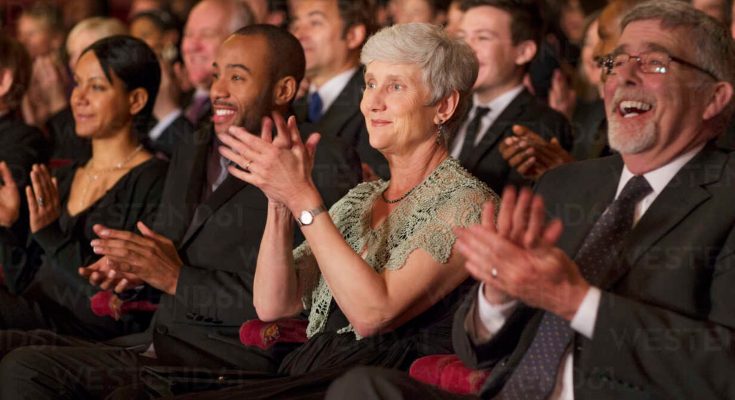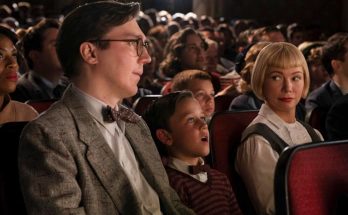The Aurora Film Society subscribers selected twelve movies, for our 2023 theatre series, last week. Our board will have dates picked for our 2023 series next week. If you haven’t renewed your subscription or want to join our group for the first time, you can subscribe to the 2023 season here.
You will find trailers and synopses for the twelve films for 2023 below.
Lone Star [1996 / John Sayles / 135 minutes]
Within an already impressive body of work, “Lone Star” stands as one of John Sayles’ crown jewels. Yes, it’s a murder mystery, but it’s also about old debts, & about what we choose to remember, & about our generational tendency to look the other way at the police brutality & state-sanctioned murder, & about how —as John Ford said —we print the legend when the legend becomes fact. It’s a cunningly plotted detective story, but Sayles takes his time letting the characters advocate for themselves, giving them each a little gracenote, the small telling details that lets us know who they are & what they value. I don’t know of a director alive who can marshal such a diverse brew of cultures & languages while maintaining such a gripping narrative as John Sayles does. He is one of America’s national treasures, & with the release of each of his films, I find myself learning more & my sense of compassion expanding.
OSS 117: Lost In Rio [2010 / Michel Hazanavicius / 101 minutes]
Mel Brooks rewrites James Bond. Hubert Bonisseur de la Bath (Jean Dujardin) is Agent OSS 117, a sleek doofus, borderline racist and insouciant secret agent assigned to track down Nazis in Brazil. This deadpan spoof of 1960’s spy thrillers (set in 1967) brings to mind Inspector Clouseau and Austin Powers. A gaga, farcical pop cultural artifact.
A Girl Walks Home Alone At Night [2014 / Ana Lily Amirpour / 101 minutes]
You’d be forgiven for assuming that is another misogynistic women-in-peril flick, considering the title. (It’s about as on the nose as you can get.) But “A Girl Walks Home” is actually a whipsmart blend of “Sin City”-like noir visuals, Sergio Leone spaghetti westerns, & the modern subgenre of the “urban vampire” movie. (Think “The Hunger” or “The Lost Boys” & you’re mostly there.) Amirpour’s debut feature film was made in California with an Iranian cast speaking exclusively Persian. (You read that right.) Sheila Vand plays a “lonesome vampire” who travels by skateboard & wears an enormous chador through the deserted streets of Bad City, stalking her prey by night. (Her victims are pretty much all bad guys.) Shot in stunning black-&-white that’s best experienced on a big screen, & featuring one of the most epic slo-mo screen kisses in cinema history. (Seriously.)
Coriolanus [2011 / Ralph Fiennes / 123 minutes]
Ralph Fiennes’ directorial debut transplants Shakespeare’s late tragedy from Rome to an unnamed modern nation ripped apart by internecine conflict, imbuing the story with an eerie, No Such Place/No Such Time vibe. This world has camera crews & machine guns, & indeed this is a film very much about how we portray our modern military; about spin & information wars & unspoken yearning for Fascism in some of the populace; & perhaps a bit about how we receive our homecoming veterans, how we too often simultaneously lionize & otherize them. The action scenes are astonishing at times, though even more astonishing is the intensity of Fiennes’ portrayal of the title character. His Coriolanus is multi-faceted: He’s both admirably egalitarian & courageous on the battlefield, & openly authoritarianin peacetime, & Fiennes lets those contradictions sit together. & the rage Fiennes evokes as bellows “I banish you!” to a pundit show audience of ingrates is alone worth the price of admission.
Son Of Monarchs [2021 / Alexis Gambis / 97 minutes]
“Rather like the butterfly wings that are its central metaphor, “Son Of Monarchs” is deceptively fragile-seeming, yet robust, structurally complex & vibrantly hued. Written & directed by French-Venezuelan Alexis Gambis —himself a biologist —it spins an elaborate skein of thematic threads, including questions of national & familial identity, tradition & innovation. In the wake of the recent abuses of the Trump regime & its animus towards Mexico, the film also focuses on frontier crossings, with references to the fact that the Monarchs are inveterate flouters of border rules in their migrations between Mexico, the US & Canada. Named after pioneering geneticist Gregor Mendel, Tenoch Huerta Mejía is a Mexican biologist based in New York, where his research involves optics, pigments & genetic modification & involves the evolution of butterfly wings. This is a visually flamboyant film, sometimes mesmerizingly so, from the macro to the micro level: Alejandro Mejía’s Scope photography often plays hypnotically with shifts of color, from the atmospheric purple of a lab wall at night to the iridescent patterns that Mendel’s hand traces on a window.” (Adapted from Jonathan Romney’s review, Screen International [01/30/2022]
Neptune Frost [2021 / Saul Williams & Anisia Uzeyman / 110 minutes]
“In broad strokes, co-directors/life partners Williams & Uzeyman’s script focuses on a slow-burning cataclysmic conflict between hazily defined factions is a-brewing, though the stakes —nothing short of the soul of Africa, denuded of its resources & left by industrial concerns to wither —are evident. There’s a loose logic threading together the disjointed scenes with a handful of spontaneous eruptions into electro-pop musical numbers. Embellished by blacklit pops of purple & orange, occasionally filtered through an effect simulating a TV set’s screen, their world imagines the dystopia of “Mad Max”as a more specifically cyberpunk wasteland. Everyone’s surrounded by the ruins of gadget capitalism, with some repurposing the detritus into their fantastic costuming with a craftiness that places them in a long, accomplished tradition of African art defined by deprivation & innovation. Whether cooking whatever would grow in an arid climate or making music with anything on hand (many of the songs employ natural percussion & call-and-response repetition), the pattern of excellingby making do extends to the film’s triumphantly recycled production design. It’s a work of rich ideas & vibes so plentiful that the narrative obliqueness feels like an inviting challenge. It earns the attention it demands.” (Adapted from Charles Bramesco’s review, Little White Lies Magazine [09/12/2021]
9. Minari [2020 / Lee Isaac Chung / 115 minutes]
“Set in the 1980s on the cusp of Ronald Reagan’s presidency, it is the autobiographical story of a Korean-American family adjusting to life in Arkansas after moving from the West Coast, a story of faith & resilience, but also resistance to cultural & social assimilation. Patriarch Jacob (Steven Yeun) seeks to develop a farm growing Korean crops, but his obsession with the idea of making his farm a success appears almost Sisyphean in the seemingly neverending procession of setbacks that unfold across the film’s runtime. Chung’s delicate hand is clear from the outset, depicting the family (with sleeping children) pull up behind the rental truck transporting them to another fresh start. The film’s hazy, dreamlike images evoke the ephemeral nature of Jacob’s promise to his family —one that has apparently been made time & again. What Jacob appears oblivious to is that working for self-sufficiency requires its own kind of faith. Chung’s ambiguous depiction of faith suggests that God &the American Dream are similarly ill-defined presences. This is the contradiction at the core of his character, that without realizing, he is both rationalist & dreamer, a paradox embodiedin the film’s practically spiritual (perhaps even Malick-esque) imagery.” (Adapted from Kambole Campbell’s review, Little White Lies Magazine [03/30/2021]
Cure [1997 / Kiyoshi Kurosawa / 111 minutes]
No one makes movies like Kiyoshi Kurosawa (no relation to Akira). Every scene in “Cure” feels drenched in a sense of dawning dread, though you’d be hard-pressed to pinpoint why, especially in the most prosaic scenes. That Kurosawa avoids excessive gore & jump-scares in favor of character development & philosophical complexities still makes him a rare bird in modern horror filmmaking, but when this film was released in the late ’90s, there was nothing close to compare it to. Kōji Yakushoplays a Chiba Prefecture detective who seems to personify emotional desolation, struggling with his clinically depressed wife at home & a string of puzzling serial murders on the job. Each time, the MO is the same, but the killer is a different person who has no memory of the events or motive to kill. One possible connection arrives in the form of Masato Hagiwara, a young man who seems to have even more severe short-term loss (eg, inability to remember his name or where he is, etc). Remember: In the final scene, don’t take your eyes off the screen until it cuts to credits!
Fresh [1994 / Boaz Yakin / 115 minutes]
“Fresh” is the kind of film where you get to the end & ask yourself: “How am I just now seeing this?!” Released in 1994, it got unfairly lost in the shuffle of the first wave of American films depicting inner city life for people of color, but “Fresh” is another kettle of fish entirely. Writer-director Boaz Yakin prefers to present the majority of the violence just off-screen; in that way, & in its doleful tone, “Fresh” to me more closely resembles Robert Bresson’s first films. As the titular character, Sean Nelson (a newcomer & all of 13) turns in a marvelously focused performance; as the film progresses, you see his eyes change from resigned to enraged to finally steeled & resolved. Because Fresh has a plan, a plan to extricate himself & his drug-addicted sister from the clutches of a particularly repellent pimp-dealer (played beautifully by Giancarlo Esposito). It’s a plan so audacious that no one would suspect a 13-year-old kid could come up with it. In Fresh we trust.
Living In Oblivion [1994 / Tom DiCillo / 90 minutes]
Independent film director Nick Reve (Steve Buscemi) is struggling to complete his first feature film. Everything that can go wrong does: the rebellious catering crew is serving spoiled food and refuses to correct it, the actors are dysfunctional and it’s impossible to film an unspoiled take with them. Tension between lead actress Nicole (Catherine Keener) and actor Chad (James LeGros), who have just slept together, cause much of the problems on set. Reve struggles to complete his film as funding and time run out. Several real-life failures from DiCillo’s career are represented here but the satire is aimed at just about any of the difficulties in independent filmmaking (a less than glamorous enterprise as it turns out). The film’s transitions from color to black-and-white are beautifully photographed with several different film stocks in evidence. Perhaps DiCillo’s most beloved film, “Living In Oblivion” is considered a minor comedic masterpiece. It won a screenwriting award at Sundance in 1995. Sharp, clever, and hilarious.
Even The Rain [2010 / Icíar Bollaín / 104 minutes]
Set in Bolivia in 2000, this film is both a droll commentary on cinematic “historical” epics & a truehearted depiction of a successful indigenous-Latino peasant uprising against the privatization of their water supply. Gael García Bernal & Luis Tosar play a film director & his producer (respectively) trying to film —on the cheap —a historically honest depiction of Christopher Columbus’s subjugation of the New World, but they keep running into problems: the actor playing Columbus is an alcoholic contrarian, & the local actor they’ve cast as Columbus’ bête noire, Hatuey (played by Juan Carlos Aduviri), turns out to be the same firebrand they’ve been reading about in the newspapers leading the ever-larger scale social protests against the corrupt American corporation Bechtel. It’s not a dry (no pun intended) history lesson though; references to past classics like “La Dolce Vita” & “Fitzcarraldo” abound, & director Icíar Bollaín manages to strike an excellent balance between the absurd comedy of the film production & the very real & terrifying stakesfor the protesting farmers. Bernal & Tosar’s characters eventually become sympathetic to the Bolivian people who have no choice but to rise up when, as the title says, “They sell off our rivers, & even the rain.” The final images of the protest’s end remain unforgettable to me, both haunting & triumphant.
Common Wealth [2000 / Álex De La Iglesia / 107 minutes]
Álex De La Iglesia is one of Spain’s true originals. He’s directed horror films, action-crime films, a western, a supernatural comedy, & a screwball gothic murder mystery set in a department store, & he does it all with gonzo to burn & a dash of black humor. In this film —a sort of “thrill-omedy” —screen legend Carmen Maura plays a green real estate agent who lucks onto a pristine, beautifully-appointed apartment in an otherwise neglected building. A leak in the ceiling leads Maura to the gruesome discovery of the dead man living (well, staying) above. The deceased was a notorious miser who’d won the lottery but refused to spend a single peseta. The rest of the building’s dwellers had signed a blood oath to split the old man’s fortune between them, assuming it’s still hidden somewhere in his apartment. What they don’t know is that Maura has discovered the loot too, & that she’s already squirreled it away somewhere in the building. & then the killings begin . . .



